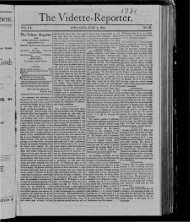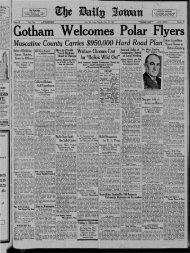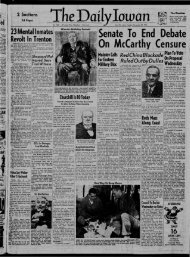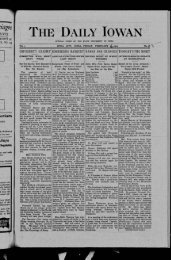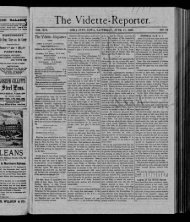I
April 14 - The Daily Iowan Historic Newspapers - University of Iowa
April 14 - The Daily Iowan Historic Newspapers - University of Iowa
- No tags were found...
You also want an ePaper? Increase the reach of your titles
YUMPU automatically turns print PDFs into web optimized ePapers that Google loves.
Pale 4-'Ibe Dally Iowan-Iowa City, Iowa-FrIday, Aprf114, 1m<br />
lewpoln s<br />
Friday,<br />
'EleCtrical<br />
Cogeneration<br />
The extremely mean weather of the winter just ended and<br />
its effects on energy supplies are being used to promote<br />
wasteful and possibly dangerous energy sources.<br />
However, little is ever said about energy conservation or, if<br />
it is said, it comes down from the highest priests of the energy<br />
giants tellings us to turn out our lights and drive slower.<br />
Conservation of energy is given the short shrift. Supposedly,<br />
if we do much more than turn off our lights, the days of the<br />
Grea t Depression of the 1930s will be back with us.<br />
But a dirty little secret should be let out of the bag. It is just<br />
not so. West Gennany, Switzerland and Sweden all live at<br />
about the same standard of living as the United States but<br />
they do it by using only half as much energy per person as we<br />
use. One of their best energy conservation methods is<br />
cogeneration. ,<br />
Electrical cogeneration involves saving the waste heat<br />
power plants produce and using it again. West Gennany<br />
supplies about 12 per cent its electrical needs by<br />
cogeneration. Electrical cogeneration can be used two ways:<br />
One way is to use steam from large central power plants at<br />
industrial sites near the power plant. The second method uses<br />
smaller local power plants right at the industrial site. The<br />
second method is being used here in the United States now in<br />
such energy-intensive industries as oil refining and paper<br />
making.<br />
Both methods have drawbacks. Wit/! the first, and industrial<br />
site must be nearby that has steam requirements<br />
similar to the amount being saved by the power plant. The<br />
second method goes totally against the trend toward large,<br />
centralized power plant construction.<br />
Utility's construction plans ~re calling for these large,<br />
central power plants to be located away from major con·<br />
centrations of people and industry. The economies of scale of<br />
power production many times dictate the use of large power<br />
plants. It is cheaper ~ produce large amounts of electricity<br />
than small amounts.<br />
Other drawbacks to cogeneration are electrical rates and<br />
the cheap price of energy in general. Most electrical utility<br />
rate structures are set up on the principle that the more<br />
electricity a customer consumes, the lower the per unit rate.<br />
Cogeneration is a way of sa ving energy, but if there is no<br />
incentive to save energy (conserve), little conservation<br />
(saving) takes place. In fact, our cheap energy prices may<br />
well be at the heart of our energy problems.<br />
For instance, think of cogeneration as a technological<br />
II innovation (which it is). All Dr. Kenneth F.E. Watt of the<br />
University of California-Davis says: "You don't need<br />
technological innovation if everything is so cheap you don't<br />
need to be efficient."<br />
Because energy is traditionally more expensive in the<br />
European nations than it is here in the United States, they are<br />
under much more pressure to come up with innovations that<br />
are energy-efficient. We have just begun to experience that<br />
type of preliSure.<br />
Should wI go a route emphasizing solar energy and conservation,<br />
cogeneration will fit in perfectly. One possible<br />
solar energy technology is biomass. This involves growing<br />
plants that are harvested and mulched to produce methane, a<br />
major constituent of natural gas.<br />
The methane can then be burned as natural gas for a power<br />
plant or used directly to fuel furnaces and other heating<br />
systems. Because no energy generating system is 100 per<br />
cent efficient, the waste heat can be saved and used again.<br />
Besides stretching current energy supplies as all energy<br />
conservation methods can, cogeneration is a painless way of<br />
reducing the impact energy generation has on the environment.<br />
Also, cogeneration, along with other energy<br />
conservation methods, can lessen our dependence on<br />
dangerous energy sources such as coal and nuclear power.<br />
To bring about an increasing use of cogeneration, smaller<br />
power plants buill in areas of industrial concentration must<br />
be emphasized. Also, electrical rate structures that encourage<br />
conservation must be implemented. These rates<br />
would be set on a inverted rate structure: that is, the more<br />
electricity that is consumed, the higher the rate per unit that<br />
is charged. As mentioned earlier, this is the opposite of most<br />
current utility rate structures.<br />
Say the United States goes the cogeneration route: what<br />
can be expected? The California Energy Commission found<br />
that cogeneration would supply 140 billion kilowatt hours of<br />
electricity per year for California alone - roughly equal<br />
to California's total electrical usage in 1975. (A kilowatt hour<br />
is the amount of time it takes to consume one kilowatt of<br />
electricity. It need not be one hour long.) The California<br />
figure is probably overly-optimistic, but it shows that<br />
cogeneration has strong potential.<br />
But before we dream too much, we should realize<br />
cogeneration's limits, which are mainly political and<br />
economic.<br />
Cogeneration is strictly a good short-tenn conservation<br />
method available right now. Cogeneration does nothing about<br />
making our energy resources and the wealth they produce<br />
more accessible to the general public and less in control of<br />
the large energy corporations and utilities.<br />
Also, as of right now, cogeneration assumes that power<br />
plants will be the main sources of electricity. Presently, most<br />
power plants are fueled by dangerous substances such as<br />
coal and nuclear fuel, or by sources controlled by the large<br />
energy corporations, such as natural gas and oil.<br />
But cogeneration will help conserve energy and make the<br />
switch to sane, safe, renewable energy sources, such as solar<br />
energy, easier to implement. In fact, as mentioned earlier,<br />
cogeneration could easily become part of the energy picture<br />
with solar energy.<br />
Of course, cogeneration could just as easily be in the<br />
pclture if we go the coal and nuclear route. However, this<br />
seems unlikely because the coal and nuclear route emphasizes<br />
an extremely energy-intensive economy with all its<br />
inherent wastefulness and environmental degradation.<br />
Cogeneration is just too sensible to be used in that insane<br />
scheme.<br />
As the Council on Environmental Quality, a presidential<br />
advisory agency, said in Its 1971 report: "It behooves us to<br />
achieve a greater measure of (energy) effiCiency and to use<br />
renewable energy resources before the conventional fuels<br />
are prohibitively scarce or high-priced."<br />
JOHN PAUL DORNFELD<br />
Staff Writer<br />
Readers: War resistance, libe~ation, .<br />
Survival strategy<br />
To the Editor:<br />
On April 17, the U.S. Government collects its<br />
money for war. Faced with the largest military<br />
machine humanity has ever known, those who<br />
oppose this expenditure for killing use a variety<br />
nf approaches. One of them is war tax resistance.<br />
Another is demonstrating against the war<br />
machine at federal buildings across the country.<br />
The Women's International League for Peace<br />
and Freedom and the Catholic Worker are<br />
planning legislative and direct actions in Des<br />
Moines.<br />
Two legislative bills are of importance. The<br />
Transfer Amendment, to be introduced by<br />
Parren Mitchell in the House and George<br />
McGovern in the Senate, would transfer funds<br />
from the military budget to areas of human<br />
needs. Another pertinent piece of legislation is<br />
the World Peace Tax Fund bill (H.R. 4897-5.880),<br />
which would allow those conscientiously opposed<br />
to war a legal alternative to paying war taxes.<br />
The issue of war tax resistance must be seen in<br />
the larger context of disannament. The<br />
Mobilization for Survival, a coalition of groups,<br />
is leading the na tionwide disarmament campaign.<br />
Two actions deserve particular attention:<br />
- Rocky Flats. Rocky Flats is where aU the<br />
triggers for all the nuclear bombs in this country<br />
are built. The state of Colorado has detennined<br />
that the presence of highly radioactive material<br />
llt Rocky Flats presents a clear danger to its<br />
LIKED THE ~y. ~<br />
workers and to the surrounding areas. But the<br />
federal government must act if Rocky Flats is. t~<br />
be closed. Accordingly, there will be a national<br />
demonstration at Rocky Flats, April 29 and 30. A<br />
bus will be leaving from Iowa; for local contacts,<br />
call Free Environment at 35S-3888 or the Iowa<br />
Socialist Party at 338-3061.<br />
• - On May 27, the UN Special Session on<br />
Disarmament will begin in New York City. Only<br />
LeHers<br />
--~--~----------~---- . ~-<br />
two countries, both of them nuclear powers,<br />
voted against the special session: The United<br />
States and the People's Republic of China.<br />
Because our nation is on record against this<br />
discussion of disannament, it is crucial that all<br />
thuse Americans who see disarmament as a<br />
matter of survival, who are not hesitant to put<br />
human values above those of property, who favor<br />
funding human needs Instead of wa , tell our<br />
government that we ' support this effort .<br />
Accordingly, the Mobilization for Survival is<br />
holding a mass rally in New York City, May ZT, to<br />
support the Special Session and to tell our<br />
gnvernJllent that we are in earnest about our<br />
priorities: zern nuclear weapons; ban nuclear<br />
InHMS! ')1 ANDm~ ~ ~Nlct<br />
\ / ~st~!<br />
/<br />
April 14, 1978 Vol. 110, No. 182<br />
Oplt.onI ."",... od on lit ... p ••",.tIl. opo ....... oItIlo ,.gned ..._a t""NY na4 n-*f be "-of ",.<br />
DIJy '0•.,.<br />
PuItIo_1I'I Stude,... PuItIoc.a'ona. ln



